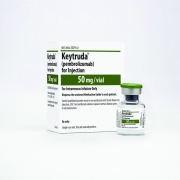Merck announced the publication of results from the Phase 3 KEYNOTE-522 trial in the Feb. 10, 2022 edition of the New England Journal of Medicine. Results showed that neoadjuvant Keytruda in combination with chemotherapy followed by adjuvant Keytruda as monotherapy, significantly prolonged event-free survival compared with neoadjuvant chemotherapy followed by adjuvant placebo in patients with high-risk early-stage triple-negative breast cancer (TNBC).
Easier-to-produce COVID vaccine shows promise in trials; nasal spray vaccine booster works in mice
Clinical Trials, COVID-19 booster shots, COVID-19 shots, COVID-19 Vaccines, Immune System, Immunity, Intranasal vaccines, Low-Income Countries, Lung Transplants, Messenger RNA (mRNA) Vaccines, Mice, Middle-Income Countries, Nasal Sprays, New England Journal of Medicine, R&D, Researchers, Yale UniversityA COVID-19 vaccine that can be produced locally in low-income and middle-income countries is yielding promising results in early clinical trials, researchers say. Other researchers believe that once the body has been “primed” by mRNA vaccines to recognize and attack the coronavirus, a booster containing purified versions of virus’ spike protein that could be given intranasally would have many advantages.
Studies Forge On as Omicron Surges and More COVID-19 News
BNT162b2 (Pfizer and BioNTech), Clinical Trials, Coronavirus Disease (COVID-19) Pandemic, COVID-19 Studies, COVID-19 Therapeutics, COVID-19 Vaccines, Data, Hospitalized COVID-19 Patients, Inhaled Formulations, Janssen COVID-19 Vaccine (J&J), mRNA-1273/Moderna COVID-19 Vaccine (Moderna), New England Journal of Medicine, Omicron (B.1.1.529) (South Africa), R&D, Therapeutics, VentilatorsIn the last two years, the sheer volume of scientific research focused on COVID-19 has been astounding: thousands of clinical studies, dozens of vaccines and new compounds, and hundreds of approved drugs tested for efficacy. More studies are still being run, especially in light of the Omicron surge and the virus’ ability to evolve.
Researchers from Harvard University and the U.S. Department of Veterans Affairs (VA) found that the Moderna mRNA vaccine was slightly better than the Pfizer-BioNTech vaccine.
AstraZeneca Plc’s Covid-19 vaccine demonstrated 74 percent efficacy at preventing symptomatic disease, a figure that increased to 83.5 percent in people aged 65 and older, according to long-awaited results of the company’s U.S. clinical trial published on Sept. 29
What is the key to a robust immunity against SARS-CoV-2? According to a study recently published in The New England Journal of Medicine, it could be a previous SARS infection—more specifically, the one that spread across 29 countries between 2002 and 2004—plus vaccination.
Amgen announced new data from the pivotal NAVIGATOR Phase 3 trial demonstrating that tezepelumab reduced exacerbations and improved lung function and nasal symptoms in patients with severe, uncontrolled asthma and comorbid nasal polyps.
The use of Pfizer Inc. and German partner BioNTech SE’s widely used Covid-19 vaccine marginally increases the risk of heart inflammation, but the risk is higher among those infected with the coronavirus, a study published on Aug. 25 in the New England Journal of Medicine showed.
Health Technology Special Feature: Not Always Created Equal
Artificial Intelligence, August 2021, Data, Data Analysis, Ethnicity, Health Technology, Healthcare Communications Agencies, Issue Archives, Marketing & Advertising, Med Ad News, New England Journal of Medicine, Patients, Race, Special Features, TransparencyData and AI scientists must strive to eliminate bias from anything that touches patient care.
An experimental monoclonal antibody developed at the U.S. National Institutes of Health (NIH) prevented malaria for up to nine months in volunteers exposed to the disease-causing parasite in a small trial, researchers reported on Aug. 11 in the New England Journal of Medicine.









